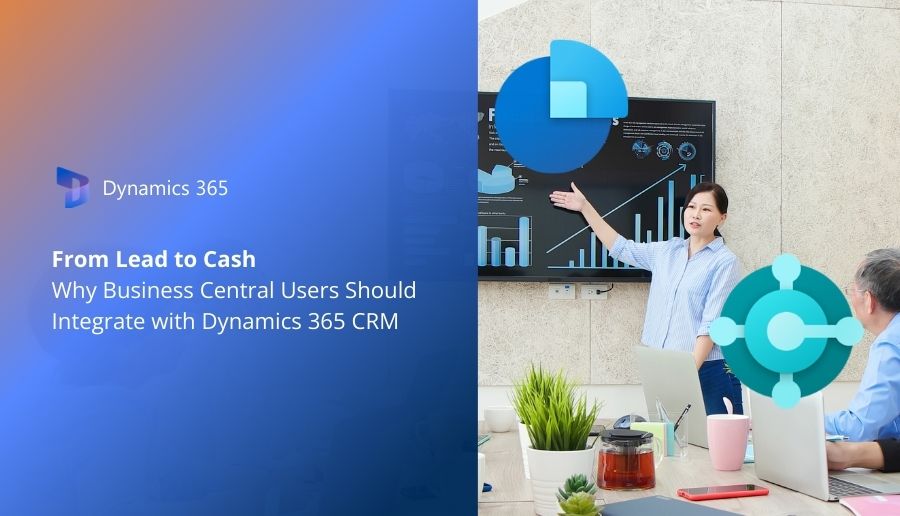
Is Your CRM Holding Your Business Back?
You’re already using Business Central, so you know the power of a strong ERP system. But if your sales, customer service, or marketing teams are using a separate CRM—one that doesn’t integrate well—you might be facing challenges like:
- Duplicate data entry—manually re-entering customer info, sales orders, or invoices.
- Delays and miscommunication between sales and finance.
- Inconsistent customer data—finance sees one version, sales sees another.
- Complicated, expensive integrations that never quite work the way they should.
The problem isn’t Business Central—it’s that your CRM and ERP aren’t speaking the same language.
Here’s the good news: Microsoft has already built the perfect solution for Business Central users. Dynamics 365 CRM connects directly with your ERP, eliminating these problems while unlocking better automation, reporting, and customer insights.
Why Choose Dynamics 365 CRM Over Another CRM?
Many companies start with a third-party CRM (like Salesforce, HubSpot, or Zoho) because that’s what their sales team is familiar with. But once they start scaling their business, integrating new tools, and relying more on Business Central, they quickly run into issues.
True, Native Integration with Business Central
- With Dynamics 365 CRM, deals closed in CRM automatically create sales orders in Business Central—no extra steps.
- Sales teams and finance teams work with the same customer data, eliminating errors.
- Customer history, invoices, and account status are all visible in one place.
A Single Microsoft Ecosystem
- You already trust Business Central—so why use a CRM that doesn’t fit within the same system?
- Microsoft’s cloud-based approach means security, compliance, and seamless updates across all apps.
- You can extend Dynamics 365 CRM with Power BI for reporting, Power Automate for workflows, and Microsoft Copilot for AI-driven insights—without third-party connectors.
Better User Experience and Adoption
- Your team already uses Microsoft 365 (Outlook, Teams, Excel)—Dynamics 365 CRM integrates natively with these tools.
- Sales reps can update CRM records from Outlook and even see Business Central invoice history within CRM.
- Less training, faster adoption, and a smoother transition.
The Real Business Impact of an Integrated CRM and ERP
When Business Central and Dynamics 365 CRM work together, you get faster, more efficient processes that improve every part of the business.
Sales Teams Close Deals Faster
- Sales reps see customer financial data (open invoices, purchase history) without asking finance.
- When a deal is won, the order is created instantly in Business Central—no manual handoff.
- No more lost details or delays—just faster sales cycles.
Finance Teams Get Paid on Time
- Invoices are automatically generated from CRM data, eliminating errors.
- Real-time syncing means no discrepancies between finance and sales teams.
- Payments come in faster because everything moves smoother.
Leadership Gains Full Visibility
- With real-time dashboards in Power BI, leaders can see:
- Sales pipeline, forecasts, and revenue trends.
- Customer lifetime value and outstanding invoices.
- Marketing campaign performance tied directly to sales outcomes.
- No more disconnected reports—just a single source of truth.
Why TMC? Because Technology is Only as Good as the People Behind It.
Why TMC? If Your CRM Partner Isn't Helping You Succeed, It's Time for a Change.
Many businesses choose a CRM vendor or partner only to realize later that they're not getting the support they need. If any of these sound familiar, it might be time to rethink your approach:
- Your current CRM partner isn't proactive—they set up the system but don't help you optimize or maximize its potential.
- When issues arise, support is slow or unhelpful, leaving your team frustrated.
- The CRM and Business Central don't work together seamlessly, causing inefficiencies and extra manual work.
- You're struggling to get true business insights because data is still fragmented.
At TMC, we do things differently.
- We're a holistic Microsoft partner—which means we don't just implement CRM, we make sure it works seamlessly with your ERP and the rest of your Microsoft Stack.
- We have a 99.9% employee and client retention rate—which means our team stays with you for the long haul, ensuring consistency and ongoing support.
- We focus on people first—because when you build a healthy, thriving culture, you attract and retain the best of the best. At TMC, we don't just hire for skills—we hire experts who are passionate, knowledgeable, and committed to excellence.
- Our strong culture brings in top talent, and top talent leads to successful
implementations and long-term client success. After all, happy people do great things—and that's exactly why our projects succeed.
- We take a hands-on, strategic approach—we don't just set up your system and walk away. We help you optimize, automate, and get real business value from your investment.
The Bottom Line: Business Central Works Best with Dynamics 365 CRM
If your CRM and Business Central aren't fully integrated, you're making things harder than they need to be. By switching to Dynamics 365 CRM, you can:
- Eliminate data silos—sales, finance, and leadership work with the same real-time information.
- Speed up sales and invoicing—automate processes and remove manual entry.
- Improve forecasting and decision-making—use AI and analytics to drive business growth.
If you're tired of working with a CRM partner who isn't delivering or ready to level up your system to integrate with your ERP, let's talk. TMC isn't just another Microsoft partner—we're the partner who will never outgrow you.





